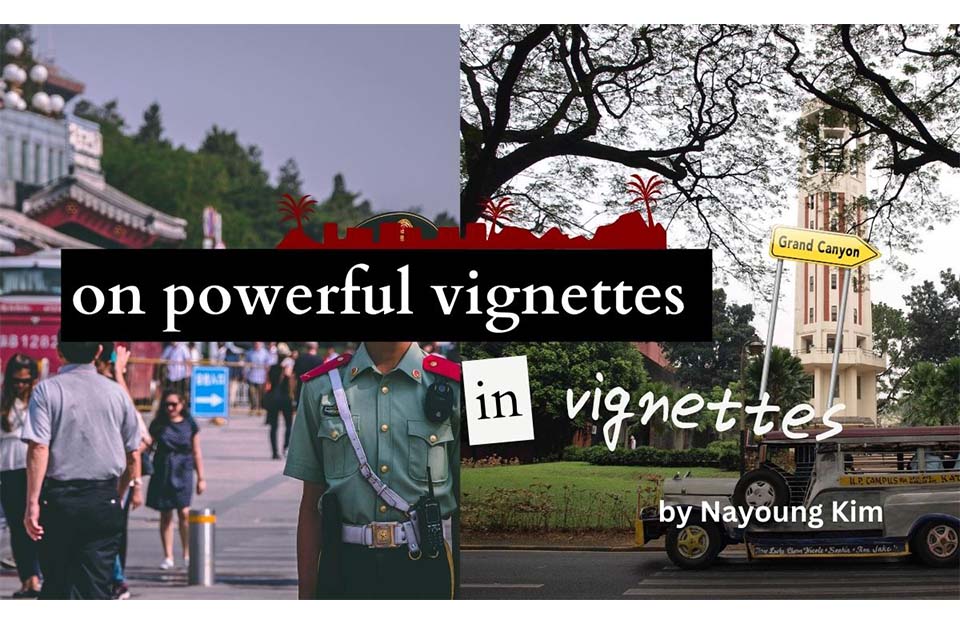The Personal is Analytical: Nayoung Kim Breaks New Dissertation Ground With Website

Photo Credit: Nayoung Kim
February 16, 2024
Abigail Arnold | Graduate School of Arts and Sciences
Sixth-year English PhD student Nayoung Kim was the first Brandeis Graduate School of Arts and Sciences student to complete a non-traditional dissertation. In response to the English department’s 2021 decision to change the structure and requirements of their PhD program, including allowing dissertations beyond the traditional book-length manuscript that the discipline usually demands, she created Prismatic Reader, an eye-catching website that combines analyses of contemporary novels with reflections on her own process and PhD program experiences, photographs and doodles, text in both English and Korean, and even a recording of her babbling baby. Kim, who defended her dissertation in December of 2023, said that when coming up with the idea, “I wanted to think about how I communicate my content and the thoughts I have about my project. I wanted it to reach people easily and not be encased in ProQuest. I really wanted to be accessible to people, and a website is a super accessible medium.” Here’s how she created her non-traditional dissertation.
Kim found that thinking outside the box for her dissertation also meant challenging her own ways of thinking. When planning the website, she said, “It wasn’t a logical step by step but an accumulation of ideas. I mainly started with a concept and a color scheme that might go well with it and kind of tweaked it along the way. Everything was sprawled. It was an experiment and kind of a learning process–I’m an academic, and my brain is really coded to think in the chronological line-by-line way. Breaking away from that was really crucial to figuring out the entire thing.” In consequence, the Prismatic Reader website does not follow a linear structure but allows the reader to click around and select what they would most like to view. Individual pages link to others, and Kim tags smaller sections with terms like “Bits and Pieces” and “Moments.” She said, “I really wanted people to actually retrace my steps of making this entire project. You don’t necessarily have to start from an intro piece and work yourself through–you can pick and choose what interests you the most. I wanted to create a cluster of content that people can navigate freely.”
In addition, Kim worked to break down traditional distinctions between personal and academic life. She said that when thinking about where to add visuals to the website, “I tried to follow my own flow of thoughts, which are often quite spontaneous and more organic compared to when I set myself to write a traditional academic article. I wanted to follow the way my brain processes things–I was coming up with images on the spot while writing and thinking of how to incorporate them. This freed up my thinking and allowed me more wiggle room to incorporate some odd and seemingly unrelated images. It was very liberating, and I really rejoiced in it.” Her choice to incorporate writing about her own experiences, such as in her essay about being a mother while writing a dissertation, combined a professional dimension of trying to convey a critical idea in which she is personally embedded and a personal dimension of seeking to refashion herself as a storyteller.
Kim also considered the audience for her public-facing project. She sees them as people who are interested in contemporary English language fiction and hopes to share new thoughts on these texts with them. “I’m hoping I can contribute a new line of interpretation for a body of very popular contemporary fiction, especially diaspora and environmental,” she said. “I wanted to offer a seed of different interpretations.” She also considered her dissertation’s place in its own ecosystem. “I hoped for more robust discussion about examples of nontraditional dissertation and how you do it, because I had a hard time navigating the resources,” said Kim. “I would like to initiate an ongoing conversation arena and start putting information there.” She did draw inspiration from Anna Williams’s My Gothic Dissertation podcast, which she said was “emotionally and mentally encouraging” in showing that a non-traditional dissertation was possible, and participated in a panel with Williams, organized by GSAS’s Jon Anjaria.
For Kim, the dissertation project is ultimately a personal one. “I would recommend thinking about your values first. By values, I mean something that can be non-negotiable,” she said. “For me, I realized that was inserting or reflecting on my experience as a person in my critical practice. I’d forgotten about that for a long time, and it was really crucial to insert back into the project. The rest–the medium and theme–came out of that.” By reflecting on her own experiences, she created a dissertation that allowed her to try new things and blaze a trail in her department–and beyond.
Following the English department’s curricular changes, several students are working on non-traditional dissertation projects. Follow our links to read about two others, Sarah Perkins and Yi He. You can learn more about the English PhD program on our program page and the department website.






